2025 conference speakers

Judge Roslyn Silver
Senior U.S. District Judge, District of Arizona
Senior United States District Judge Roslyn Silver has served as judge for the District of Arizona since her appointment in 1994. She was the first woman appointed in the Phoenix Division and the second woman appointed in the District of Arizona. In 2011 she became the first woman Chief Judge for the District of Arizona.
Prior to her appointment to the bench, Judge Silver was Criminal Division Chief and acting First Assistant for the U.S. Attorney’s office in Phoenix. She taught as a professor at the American Institute of Paralegal Studies and at the Arizona State University Center for Executive Development. She now teaches at the Arizona State University Law School, in the Law Science Cluster Group, and is a popular Constitutional Law instructor in the Master of Legal Studies program. Internationally, she was a Professor of Criminal Law at the University of Regensburg, Germany.
Judge Silver is a lecturer for the American Conference Institute; is published in journals, including Arizona Attorney magazine, the ABA Journal and the Maricopa Lawyer; and has been a contributing editor to Federal Civil Procedure Before Trial, Rutter Group Practice Guide. She was Chair of the Ninth Circuit Article III Judges Education Committee and the District of Arizona Local Rules Committee.
Among her awards, Judge Silver was named Arizona State University Alumnus of the Year in 1996, the Arizona Women Lawyers Association’s Outstanding Member of the Legal Community in 1999 and one of 100 Significant Women and Minorities in Arizona’s Legal History in 2000. In 2012 Judge Silver received an Award of Recognition and Achievement from the Tucson Chapter of the Arizona Women Lawyers Association for her appointment as the first woman Chief Judge of the Federal District of Arizona. Judge Silver was recognized in 2013 for outstanding service to the Veterans’ Program by the Assistant Adjutant General, the Arizona Army National Guard, the Arizona Coalition for Military Families and the Arizona Veterans Magazine. That same year, she was also honored for outstanding achievement as Chief Judge for the District of Arizona by the Phoenix Chapter of the Federal Bar Association. In 2014, Judge Silver was recognized by the Arizona Association for Justice/Arizona Trial Lawyers Association, receiving the Judicial Integrity Award for commitment to the civil justice system and continued service on the bench, and was the recipient of The John M. Roll Award for Distinguished Service to the District of Arizona, presented by the Arizona Lawyer Representatives at the Ninth Circuit Judicial Conference. In 2016, Judge Silver was the recipient of the Arizona State Law Journal’s John S. Lancy Distinguished Alumni Award and in 2019, she received the Outstanding Professors Award for her teaching of Constitutional Law in the Master of Legal Studies Program.

Betsy Grey
Jack E. Brown Chair in Law, Sandra Day O'Connor College of Law
Fellow, Lincoln Center for Applied Ethics
Faculty fellow, Center for Law, Science and Innovation at ASU
Betsy Grey is the Jack E. Brown Chair in Law in the Sandra Day O’Connor College of Law, a fellow with the Lincoln Center for Applied Ethics (2017-2018) and faculty fellow with the Center for Law, Science and Innovation at Arizona State University.
Professor Grey publishes and teaches on issues of tort law, products liability and mass tort litigation, as well as neuroscience and law, and has presented to judicial conferences and other professional groups on these issues. Her recent scholarly work has focused on the study of no-fault compensation systems in the United States, as well as the impact of advancements in neuroscience on tort law. Professor Grey also has taught products liability as part of a common law program to law students in France.
Before joining ASU, Professor Grey was a commercial litigator at the Washington, D.C. law firm of Shea & Gardner, and a trial attorney for the Civil Division of the U.S. Department of Justice through the Honors Program, where she represented federal agencies and officials in litigation involving constitutional, statutory and regulatory issues. A former articles editor of the Georgetown Law Journal, Professor Grey clerked for Judge Frank M. Johnson Jr. of the 5th U.S. Circuit Court of Appeals.
Professor Grey is a member of the American Law Institute and Professional Editorial Board for Jurimetrics: The Journal of Law, Science, and Technology.

Dr. Cynthia Stonnington
Professor of Psychiatry, Mayo Clinic
Associate Medical Director of the Office of Joy and Wellbeing, Mayo Clinic
Dr. Cynthia Stonnington is a Professor of Psychiatry and Associate Medical Director of the Office of Joy and Wellbeing, Mayo Clinic in Arizona. She is the previous Chair of Psychiatry & Psychology at Mayo Clinic in Arizona. Dr. Stonnington completed medical school at Mayo Medical School in Rochester, MN, in 1986, her residency training in Psychiatry at Stanford University Medical Center in 1990 and a Clinical Research Fellowship in brain imaging at University College London’s Wellcome Trust Centre for Neuroimaging in 2007. Her current research activities focuses on testing interventions that enable people and communities to thrive amid challenges.

Dr. Holly L. Geyer, M.D.
Associate Professor of Medicine, Mayo Clinic
Division of Hospital Internal Medicine Consultant, Mayo Clinic
Holly L. Geyer, M.D., is an Associate Professor of Medicine and consultant in the Division of Hospital Internal Medicine. She is dual board certified in Internal Medicine and Addiction Medicine and serves as Physician Lead of the Opioid Stewardship Program at Mayo Clinic in Arizona as well as Medical Director of Mayo Clinic Arizona Occupational Health Services. She is a nationally recognized speaker on the topic of opioids and addiction neurobiology and has authored more than 200 journal articles, book chapters, educational pieces and abstracts. She is regularly featured television and radio media consultant and recently released the book, “Ending the Crisis: Mayo Clinic’s Guide to Opioid Addiction and Safe Opioid Use”. She is active at the local and national level addressing opioid policy and co-chairs multiple state taskforces and working groups in addition to serving as a content expert for multiple national organizations. She is also the Medical Advisor and addiction expert for the NFL Alumni Association Health Initiative and helps coordinate national activities and partnerships to educate the public about opioids.
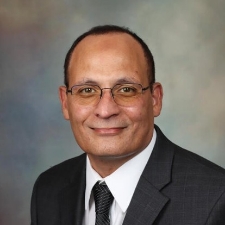
Dr. Osama Abulseoud, M.D.
Psychiatrist, Mayo Clinic
Osama Abulseoud, M.D., is a triple-board certified psychiatrist with broad focus on mood disorders, comorbid addiction and mental disorders in the course of medical conditions. Dr. Abulseoud is specialized in treatment refractory depression and bipolar disorders. He is talented in complex pharmacological management cases such as association between thyroid disorders and mood disorders.
Dr. Abulseoud treats psychiatric conditions in the course of neurostimulation such as Parkisnon’s disease patients who have deep brain stimulation (DBS). He has experience in the utility of DBS for refractory obsessive compulsive disorder (OCD) and the use of transcranial magnetic stimulation (TMS) for refractory depression.
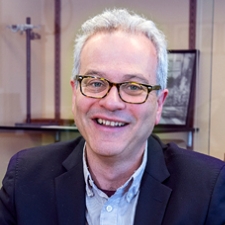
Dr. Jonathan Gewirtz
Director of Faculty Success and Professor of Psychology,
Arizona State University
Jonathan Gewirtz is a professor in the Department of Psychology. He uses rodent behavioral models to study the biology of emotion, with particular interest in negative affect (e.g., anxiety) and addiction. His current research seeks to identify biological mechanisms underlying “secondary” trauma and vulnerability to opioid addiction.

Dr. Betsy Leonard
Neuropsychologist, Neurocognitive Associates
Elizabeth L. Leonard is a clinical and forensic neuropsychologist with research interests in the area of neuroscience and law. Her current work studies the impact of brain injury in individuals involved in tort litigation and neuropsychiatric and developmental disorders in the assessment of defendants in criminal proceedings.
Dr. Leonard obtained her doctorate in psychology with a concentration in developmental psychology from Tufts University. Before focusing on mainly clinical interests, she directed a nationally funded Pediatric Rehabilitation Laboratory at Barrow Neurological Institute in Phoenix where she studied cognitive and motor function in children with brain injury and directed the Clinic for Neurodevelopmental Disorders in the Section of Child Neurology. From 2001-2011, she was on the faculty of the Department of Psychiatry at Harvard Medical School where she continues to be a Member of the Program in Psychiatry and the Law.
Dr. Leonard is a licensed clinical psychologist and maintains a clinical practice focusing on children and adults with developmental disorders and acquired brain injury. Her forensic practice includes expert witness evaluation and testimony for individuals with brain injury, fitness for duty assessments, pre-trial and post conviction evaluations for individuals with brain injury and neuropsychiatric disorders, competency assessments and consultation regarding psychological standard of care.

Dr. Michel Sucher
Arizona Medical Director, Community Medical Services
Program Director, Addiction Medicine Fellowship program Honor Health and Community Bridges, Inc.
Dr. Sucher was educated at Wayne State University where he received a Bachelor of Science Degree in 1968 and a Medical Degree in 1972. Dr. Sucher’s internship was at Sinai Hospital of Detroit in Detroit, Michigan and he underwent residency training at Indiana University Medical Center in Indianapolis, Indiana. From 1974 through 1994 Dr. Sucher practiced emergency medicine and served as emergency department director at two Honor Health facilities in Scottsdale (Osborn and Shea). He served as President of the Medical Staff of Scottsdale Healthcare (now Honor Health) Osborn during 1994.
He practices addiction medicine and served as the medical director of the physician health program/professional health programs for the Arizona Medical Board and the Arizona State Board of Dental Examiners from 1992 until November, 2019 when he transferred those programs to Community Bridges, Inc. He was also President of the California Physicians Health Program from its founding in 2008 until May 2020. He has served as the President of the Nevada Professional Assistance Program since August 2017. In June, 2024 this program merged into the Nevada Professionals Recovery Network where he is currently the Medical Director. Additionally, he serves as a consultant in addiction medicine to most other healthcare regulatory agencies and boards in Arizona.
He served as the Chief Medical Officer for Community Bridges Inc. which is a community-based substance abuse and mental health treatment program in the greater Phoenix area and throughout the state of Arizona from 2002 until April 2020. He was appointed to the CBI Board of Directors in April 2020 upon his retirement as CMO. He was also appointed as a member of the Board of Directors of the Community Bridges Foundation in 2020.
He also served as the medical director for Community Medical Services from 2011-2016, which is the largest opioid treatment program in Arizona and has OTP programs in 11 other states. He remains as a medical advisor to the CEO and an attending addiction medicine physician for Community Medical Services in their Arizona facilities. He was appointed Medical Director, AZ West Region for CMS effective December 2023
Presently, as a consultant to Community Bridges, Inc. he serves as senior medical director of the CBI Professional Medical Monitoring Program and as Program Director of the CBI/Honor Health Addiction Medicine Fellowship. Dr. Sucher directed the formation of the first Addiction Medicine Fellowship program in Arizona in 2018 as a collaboration between CBI and Honor Health.
From May 2019 until May 2023, he served as the Executive Medical Director of Meadows Behavioral Healthcare which is a nationally known treatment facility network for substance use disorders, sexual compulsivity, trauma and eating disorders. In that role he assisted MBH in developing a world class Medication Assisted Treatment Program and also was the Clinical Architect of the Meadows Malibu Health Professionals Treatment Program.
In 2021 He became a Medical Advisor to Grace Sober Living Homes in Phoenix, AZ. In 2022 he was appointed as a member of the Board of Governors of Via Linda Behavioral Health Hospital. VLBHH is a joint venture between Honor Health and Universal Health Services. Effective November 2023, Dr. Sucher has accepted a position as Lead Addiction Medicine Physician-Malibu Professionals Program with All Points North (APN).
Dr. Sucher is a Distinguished Fellow of the American Society of Addiction Medicine. He was granted Diplomate Status by the American Board of Addiction Medicine in 2009. He is also certified as a Medical Review Officer by ASAM. Additionally, he is a Past President of the Arizona Society of Addiction Medicine. He is a nationally known speaker on addiction medicine and professional health issues.

Dr. Chung Jung Mun
Assistant Professor, Edson College of Nursing and Health Innovation at ASU
Dr. Mun earned a Ph.D. in Clinical Psychology from Arizona State University, completed a clinical internship at Yale School of Medicine and underwent postdoctoral fellowship training at Johns Hopkins School of Medicine. He is a licensed clinical psychologist and leads the Biobehavioral Pain, Addiction, Sleep, and Momentary Experience (Bi-PAS ME) Research Laboratory, which is aimed at understanding and mitigating the complexities of chronic pain, addiction and sleep/circadian rhythm disturbances.
His work integrates psychosocial and neurobiological assessments, ambulatory monitoring, mHealth strategies, quantitative sensory testing (QST) and sophisticated statistical methods. His focus areas include examining the effects of sleep and circadian rhythm disturbances on pain and opioid use, assessing the impact of cannabis and cannabinoids on pain management and opioid usage, and developing innovative technology-based and emotion-focused interventions for chronic pain and opioid use disorder.
Dr. Mun’s overarching mission is to create and disseminate innovative, effective interventions that empower individuals from diverse backgrounds to effectively pursue their personal goals despite the challenges of chronic pain, and minimize opioid exposure
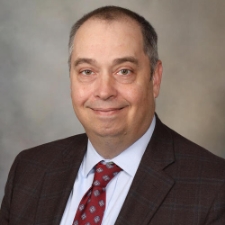
Dr. Richard Sharp
Lloyd A. and Barbara A. Amundson Professor of Biomedical Ethics Honoring Paul S. Mueller, M.D., Mayo Clinic Rochester
Richard Sharp, Ph.D., is the Lloyd A. and Barbara A. Amundson Professor of Biomedical Ethics Honoring Paul S. Mueller, M.D., at Mayo Clinic. His research examines ethical tensions in medicine and biomedical research. Dr. Sharp has studied a variety of topics in bioethics, including the integration of genetic technologies into patient care, best practices for clinical ethics consultation, the ethical conduct of clinical research and the ethical dimensions of patient advocacy.
Dr. Sharp’s current research examines how patients and health care providers view new forms of personalized medicine and clinical interventions enabled by molecular diagnostics and digital health technologies.
In addition to conducting his own research, Dr. Sharp frequently advises health care organizations on ethical issues. He has also served on advisory committees for the National Institutes of Health, the Institute of Medicine and the U.S. Environmental Protection Agency.
At Mayo Clinic, Dr. Sharp directs the Biomedical Ethics Research Program, the Center for Individualized Medicine Bioethics Program and the CCaTS Clinical and Translational Research Ethics Program. He also leads the Biomedical Ethics Section within the Department of Quantitative Health Sciences.

Dr. Keith Humphreys
Esther Ting Memorial Professor, Department of Psychiatry and Behavioral Sciences, Stanford University
Keith Humphreys is the Esther Ting Memorial Professor in the Department of Psychiatry and Behavioral Sciences at Stanford University. He is also a Senior Research Career Scientist at the VA Health Services Research Center in Palo Alto and an Honorary Professor of Psychiatry at the Institute of Psychiatry, King’s College, London. His research addresses the prevention and treatment of addictive disorders, the formation of public policy and the extent to which subjects in medical research differ from patients seen in everyday clinical practice.

Judge Douglas Rayes
Senior U.S. District Judge, U.S. District Court of Arizona
Judge Rayes was born and raised in Globe, Arizona. He earned degrees in engineering and law from Arizona State University. From 1979 to 1982, Judge Rayes served in the Army JAG Corps, where he prosecuted and later defended soldiers charged with major felonies in military courts-martial. After completing his service, he entered private practice.
In 1985, he became a partner in the firm of McGroder, Tryon, Heller and Rayes. He practiced primarily in the areas of personal injury and medical malpractice and represented police officers in administrative appeals for disciplinary actions and disability retirement. From 2000 to 2014, Judge Rayes served as a Judge on the Maricopa County Superior Court, where his assignments included the family, criminal and complex civil calendars. He also served as the Presiding Criminal Judge and was instrumental in the creation of the Veteran’s Court.
Judge Rayes was appointed to the United States District Court for the District of Arizona by President Obama and confirmed by the Senate in May of 2014. He served as an active District Judge until June 1, 2024, when he assumed senior status.

Judge Lauren Guyton
Superior Court of Arizona in Maricopa County
Judge Lauren R. Guyton was appointed in November of 2016 as a Maricopa County Superior Court Commissioner by former Presiding Judge Janet Barton. In February of 2024 Governor Katie Hobbs appointed her as a Maricopa County Superior Court Judge.
Prior to taking the bench, Judge Guyton worked as a Maricopa County Public Defender doing mostly trial work for 15 years. During that time, she participated in the Fugitive Safe Surrender program where she gave free legal service to those turning themselves in on an outstanding warrant.
As a commissioner, Judge Guyton presided over a criminal calendar and revamped the post-conviction therapeutic Drug and DUI courts. Judge Guyton reviewed every one of the almost 800 cases and insured that treatment and the court were following national best practices. Judge Guyton’s last post as commissioner was in the Juvenile Department as presiding commissioner under Judge Lori Bustamante. There she handled private severances, guardianships, adoptions and delinquencies. Judge Guyton also continued her work in therapeutic courts by presiding over the Family Treatment Court increasing its post Covid numbers from 3 to nearly 30 in approximately 6 months.
Judge Guyton is now assigned to the Family Court.
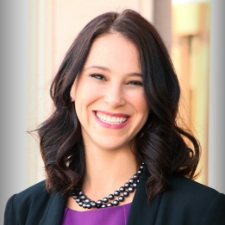
Judge Amy Kalman
Superior Court of Arizona in Maricopa County
Amy Kalman graduated from Western Washington University and Duke University Law School. After graduating, she relocated to Phoenix and worked for the Maricopa County Public Defender’s Office for eleven years in felony trials and for the last five years, in capital defense. She was a member of the Arizona Supreme Court’s Criminal Rules Task Force and Fair Justice Task Force Subcommittee on Restoration of Rights and Set-Asides, and the State Bar’s Criminal Practices and Procedures Committee.
In June 2018, Amy was appointed a Commissioner of the Maricopa County Superior Court in the Probate/Mental Health division. She handled Title 36 matters at the Desert Vista Behavioral Hospital, as well as a Probate calendar involving a combination of wills, trusts and estates, as well as protective procedures for minors and incapacitated adults. Then she rotated to a specialty criminal calendar for nine months, handling competency proceedings and drug, DUI and mental health probation calendars.
In March 2023 she was appointed as Judge and moved to the family department, where she helps families with divorce and custody matters. She is working on a task force to bring reduced-cost reunification services to families. In her free time, she nerds out on science fiction, cooking shows and obstacle races.

Judge Joshua Heath
Licensed Associate Judge, Salt River Pima Maricopa Indian Community Court
Joshua Heath is a full-time Licensed Associate Judge for the Salt River Pima Maricopa Indian Community in Scottsdale, Arizona, where he is assisting in developing an adult criminal wellness court. From 2019 to 2024, he was a full-time Associate Judge at the Tulalip Tribal Court in Washington State, where, in addition to his other dockets, he presided over the Adult Criminal Wellness Court for several years. Tulalip’s Adult Criminal Wellness Court was one of eight Mentor Courts for the National Association of Drug Court Professionals (NADCP –now called All Rise). It was the only tribal Mentor Court in the country at the time. He also assisted in establishing the Tulalip Tribal Court’s Mental Health Alternatives Program (MHAP), a problem-solving mental health court, the first and only tribal mental health court in the country.
He was a full-time Associate Judge for the Puyallup Tribal Court, in Tacoma, Washington, from 2016 to 2019, and a full-time Associate Judge for the Colorado River Indian Tribal Court, in Parker, Arizona from 2013 to 2016. He was also the Chief Justice of the Yavapai Apache Nation Court of Appeals from 2014 to 2018, has been the Chief Justice of the Makah Tribal Court of Appeals since 2020 and is also an appellate panelist for the Northwest Intertribal Court System (NICS). Before he was a judge, he was a prosecutor for the City of Glendale, AZ, from 2011-2013. He started his practice in civil litigation and consumer bankruptcy.
He was admitted to the Arizona State Bar in 2010, and the Washington State Bar in 2019. He is also a member of the Federal Bar –Arizona District, the Tulalip Tribal Bar, the Puyallup Tribal Bar and the Nisqually Tribal Bar.
He earned his J.D. from Regent University School of Law, in Virginia Beach, Virginia, in 2010, where he was a Senior Editor for the Regent Journal of Law and Public Policy and graduated in the top 25 percent of his class. He received his Bachelor’s Degree Summa Cum Laude from Grand Canyon University in 2006, where he was a Ray Mayben Scholar, the highest scholarly honor awarded to GCU students who maintain a 3.9 or better GPA with less than 12 transferable credits. He double-majored in political science and philosophy, and minored in music with an emphasis on jazz piano.
During law school, he was a law clerk for the Institute for Justice –Tempe Chapter and worked as a Judicial Intern for the Portsmouth General District Court. After law school, he volunteered with Community Legal Services and Maricopa County Attorney’s Office. He interned with the Glendale Police Records Division during his undergraduate studies, and prior to his legal career, he held jobs as a janitor, a library worker, a courthouse security guard and a substitute teacher.
In his free time, he enjoys hiking and writing novels. He is presently negotiating a book deal with a publisher.

Jason Walker
Deputy Chief Probation Officer, Maricopa County Adult Probation Department
Jason Walker has worked for the Adult Probation Department as part of the Judicial Branch of Arizona in Maricopa County for more than 20 years and currently serves as a Deputy Chief. In his current role, he oversees the Specialized Services Bureau of the agency, which includes supervision for specialty populations, therapeutic Courts and high-risk/high-needs programs. He has provided training for and implemented various large-scale initiatives related to evidence-based practices in the community corrections field.
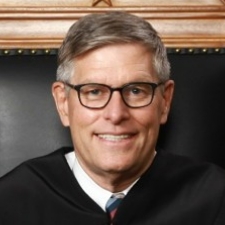
Judge Kent Cattani
Chief Judge, Arizona Court of Appeals Division 1
Kent E. Cattani has been a judge on the Arizona Court of Appeals since April 1, 2013. He earned his J.D. from the University of California at Berkeley in 1986 and worked in private practice in Phoenix until joining the Arizona Attorney General’s Office in 1991. As an Assistant Attorney General, he represented the State in over 200 cases, arguing more than 95 cases in state and federal appellate courts, including the United States Supreme Court. Additionally, he provided testimony regarding criminal justice issues to the United States Senate and House of Representatives, and he worked with the Arizona legislature and the Arizona Justice Project, as well as other stake holders, to address criminal law issues. At the time of his appointment to the court, he was serving as Arizona’s Solicitor General, overseeing civil appeals, criminal appeals and capital litigation for the State.
Judge Cattani was elected Chief Judge in 2021, and he served as Chief until July 2023. He currently chairs or participates in several committees, including Arizona’s Forensic Science Advisory Committee and the federal government’s Organization of Scientific Area Committees. He has lectured extensively both locally and nationally on criminal law and forensic science issues.

Amy Melcher
Recovery Courts Attorney, Maricopa County Public Defender’s Office
Amy, an Arizona native and graduate of the Sandra Day O’Connor College of Law at Arizona State University, has dedicated her legal career to championing justice and compassion. Beginning as a trial attorney at the Public Defender’s Office, she later found her true calling in the transformative work of the Recovery Courts. Amy’s unwavering belief is that every participant deserves not just legal representation but the opportunity to thrive in health and happiness. Committed to serving her community, she strives to uplift and empower the most vulnerable, fostering safety, stability and hope for all.
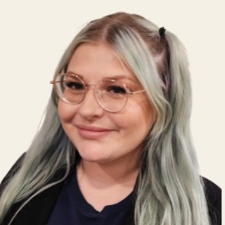
J Alexandria Hunt-Garcia
Digital Community Organizer, Dream.org JUSTICE
Before joining Dream.org, J worked closely with ACLU of Arizona Smart Justice as a volunteer to drive criminal justice reform in Arizona, with a heavy focus on women’s rights within the carceral system. Through expert relationship building with even the most unlikely allies J has worked fiercely to fight against mass incarceration. J uses her eleven years of personal experience in the criminal legal system to fuel her passion for change. With five years spent in prison J uses her experiences and expertise to change hearts and minds.
J is currently working towards a degree in Non-Profit Management and Leadership through Rio Salado College. J also serves as Secretary of the Board of Directors & Legislative Coordinator at Arizonans For Transparency and Accountability in Corrections, driving independent oversight legislation that would institute transparency and accountability in the ADCRR and increase public safety while ensuring proper care for the incarcerated.
Jeffrey Sparks
Senior Litigation Counsel, Office of the Arizona Attorney General
Jeffery Sparks currently works in the Capital Litigation Section of the Attorney General’s Office (where he has worked for approximately 14 years, though not consecutively), representing the State in appellate, postconviction and federal habeas litigation in capital and felony cases. Sparks has also worked in the past in the Appeals Bureau of the Maricopa County Attorney’s Office, and as an Assistant City Attorney for the City of Phoenix where he focused on internal police investigations and employment law. He graduated from the University of Arizona Law School in 2009.
